Brent Marchant's Blog, page 83
February 4, 2019
Check Out the Top and Bottom 10 of 2018
Check out my picks for the top and bottom 10 movies of 2018 on the latest edition of Frankiesense & More on The Good Media Network. Join host Frankie Picasso and me as we discuss our faves and least faves for the year, available by clicking here.

The post Check Out the Top and Bottom 10 of 2018 appeared first on Brent Marchant.
Tune in for The Cinema Scribe
Tune in for the latest Cinema Scribe segment on Bring Me 2 Life Radio at its new day and time, Tuesday February 5 at 2 pm ET, available by clicking here. And, if you don’t hear it live, catch it later on demand!

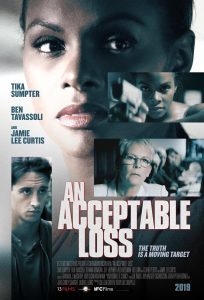
The post Tune in for The Cinema Scribe appeared first on Brent Marchant.
‘Destroyer’ makes the case for making amends
‟Destroyerˮ (2018). Cast: Nicole Kidman, Toby Kebbell, Tatiana Maslany, Bradley Whitford, Sebastian Stan, James Jordan, Zach Villa, Scoot McNairy, Beau Knapp, Jade Pettyjohn, Toby Huss, Shamier Anderson. Director: Karyn Kusama. Screenplay: Phil Hay and Matt Manfredi. Web site. Trailer.
The school of life can hand us some pretty tough lessons. If we fail in our efforts, we may come away from such experiences dejected. Those feelings can be particularly difficult to bear if we’re aware that our failings stem from wrongdoings that we might have (or should have) avoided, incidents that leave us wearing a badge of shame. And rectifying those missteps may prove quite the challenge as a downtrodden law enforcement professional discovers for herself in the gripping new crime thriller, “Destroyer.”
Los Angeles Police Detective Erin Bell (Nicole Kidman) looks like she’s been on the losing end of one too many altercations. The hard-drinking, overworked, sleep-deprived investigator comes across as being one step away from becoming a walking corpse. Yet, somehow, she manages to keep going, often following her own rules and keeping others, like her law enforcement partner (Shamier Anderson), out of the loop. Her renegade work habits have earned her a reputation among her peers. But, then, that’s due in part to what she did in the past and not just her current routine.
Sixteen years ago, when Bell was new to the job, for her first assignment, she was tasked to work an undercover operation with an experienced FBI agent, Chris (Sebastian Stan). They were charged with infiltrating a gang that roamed the nearby California desert engaging in assorted criminal activities, most notably bank holdups. The duo went in with the best of intentions but soon found themselves in over their heads, both in terms of the temptations all around them and the undeniable personal attraction that developed between them. A recipe for trouble was clearly in the offing – and on multiple fronts.
Those troubles didn’t end when the assignment concluded, either. Bell suddenly found herself the mother of a daughter, Shelby (Jade Pettyjohn), who has since grown up to be a rebellious wild child. Erin has virtually no relationship with the rambunctious adolescent; she has defiantly chosen to live with her mother’s ex-boyfriend, Ethan (Scoot McNairy), and routinely goes out of her way to irritate mom by spending most of her time with her older, surly, blatantly disrespectful squeeze, Jay (Beau Knapp). This scenario gives new meaning to the term “dysfunction.”

Los Angeles Police Detective Erin Bell (Nicole Kidman) seeks to make amends for mistakes made on a case 16 years ago in director Karyn Kusama’s latest release, “Destroyer.” Photo by Sabrina Lantos, courtesy of Annapurna Pictures.
But, if that weren’t bad enough, ghosts from that first fateful assignment have now come back into Bell’s life, dredging up painful memories and lingering regrets. One by one, she runs into former gang members (James Jordan, Zach Villa, Tatiana Maslany), some of whom have gone straight while others have continued their lawless ways. However, rather than allowing herself to be undone by these developments, Bell decides to take matters into her own hands, using these old contacts to help her make amends for her past. They put her in touch with a crooked attorney (Bradley Whitford) who can lead her to what she seeks most – the gang’s evil kingpin, Silas (Toby Kebbell). It’s a quest that Erin hopes will enable her to redeem herself for the events of so many years ago.
Thus begins the detective’s hard-fought odyssey to set matters to right. Through a series of flashbacks and the film’s main narrative, viewers discover how Bell arrived where she’s at, as well as why it’s so important for her to rectify past missteps. It’s a gritty path, to be sure, but it also holds the potential to be transformative and redemptive, considerations that Erin would like to see realized while she still has a chance.
When we stumble in life, we may think there’s no way to make up for it, that we’re fated to suffer unending and unforgiveable consequences. That can be especially true when we know we screwed up – and knew we were doing so at the time – leading us to believe that there may be no escape from our self-imposed loathing. But such is not the case. We always have an opportunity to right our wrongs to redeem ourselves. “Destroyer” shows us what it means to make the effort at doing just that. It may not be an easy process, as Erin finds out firsthand here. However, with the right intentions and a little determination, we’re likely to achieve what we set out to do, and there’s a lot to be said for that.
How well we succeed at this depends upon the beliefs we hold at the time we embark on such a journey. And that’s important given that our beliefs, thoughts and intents are the building blocks of the conscious creation process, the philosophy that maintains we draw upon these resources in shaping the reality we experience. If we believe we can succeed, there’s a good chance we will; but, if we have doubts, then the likelihood of a desirable outcome dwindles.
When it comes to Erin’s approach, she seems suitably motivated to press on to reach her goal, even in spite of her depleted condition. Years of not taking care of herself – most likely driven by beliefs in the regrets she’s been holding onto – have definitely taken their toll. Such conditions have also been exacerbated by the harsh conditions of her job. It’s a combination that has left her beaten down, the sort that would probably prompt most of us to just give up. But not Detective Bell; she know she’s got a job to do, and she’s set her mind on seeing it through.
This is true for Erin both professionally and personally. She fully realizes she hasn’t been the best mother to Shelby, and she sees the result of that in the relationship (or lack thereof) that she has with her daughter. She wants to make up for this, though that’s a tall order, given that she has to undo a lot of the damage that she caused over the years. Whatever success she attains will depend not only on her efforts, but also on how well this co-creation plays out, given that Shelby is just as much a part of what materializes as her mother is. Each will have to evaluate their beliefs about one another and whether or not they have a future together.
When faced with prospects such as these, we can always hold out hope that there’s a chance for redemption. And hope can be a potent belief in and of itself, one that can blossom into a powerful force if we allow it to express itself in fully manifested forms. For her sake, Erin had better put her faith in this notion while the opportunity presents itself.
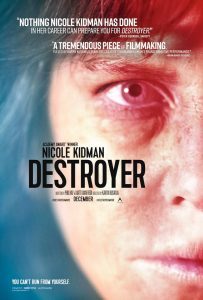
Although a bit sluggishly paced at times, this crime saga about the search for justice and redemption is a surprisingly good thriller with an excellent Golden Globe-nominated lead performance by Kidman in a decidedly different role. The clever storytelling format, coupled with a no-holds-barred approach to the action sequences, combine for an intriguing (and at times shocking) saga, made all the better by inventive editing, an eclectic but well-orchestrated mix of cinematography styles and a carefully measured sequence of revelation. Director Karyn Kusama’s latest has been getting an undeserved bad rap in some critical circles, but, thankfully, an increasing number of reviewers have been coming around on this one. Go see it for yourself and make up your own mind; you may well come away pleasantly surprised.
What we make of our second chances depends on how we approach them, particularly when it comes to recognizing the opportunities they represent. If we’re paying attention at all, we should realize that such breaks may not come our way all that often and that it would be in our best interests to jump on them when they appear. They just may make it possible for us to take off that badge of shame, something that should be especially important to someone who wears a badge for a living. Here’s wishing her (and us) luck.
Copyright © 2019, by Brent Marchant. All rights reserved.
The post ‘Destroyer’ makes the case for making amends appeared first on Brent Marchant.
February 3, 2019
‘Stan & Ollie’ celebrates persistence, reinvention
‟Stan & Ollie“ (2018). Cast: John C. Reilly, Steve Coogan, Shirley Henderson, Nina Arianda, Danny Huston, Rufus Jones, Susy Kane, Richard Cant. Director: Jon S. Baird. Screenplay: Jeff Pope. Book: A.J. Marriot, Laurel and Hardy: The British Tours. Web site. Trailer.
It’s hard to keep a good man – or a good team – down. Those who are determined to carry forward with their plans, no matter what they may be, are usually difficult to contain. And, when you add the power of a collaborative effort to the mix, the ability to hold them back may be nearly impossible. So it was for a comedy duo seeking to revive their career in their waning days as seen in the entertaining new biopic, “Stan & Ollie.”
In 1937, Stan Laurel (Steve Coogan) and Oliver Hardy (John C. Reilly) were the biggest comedy duo in the entertainment business. Their films were screened throughout the US and around the world, and virtually no one in Hollywood was bigger than they were. But, in the ensuing years, that all began to change.
Because Laurel and Hardy were under separate contacts with studio chief Hal Roach (Danny Huston), they weren’t operating on a level playing field, a source of frustration and consternation for Laurel individually (he wasn’t getting his due) and for the pair collectively (they didn’t have the creative clout they sought that a joint contract would afford). What’s more, during his contract dispute with Laurel, Roach paired up Hardy with comedian Harry Langdon (Richard Cant) for a film called “Zenobia” (1939), an incident that rubbed Laurel the wrong way. And, even though Laurel and Hardy resumed working thereafter, their career was strained – and waning.

The comedy duo of Stan Laurel (Steve Coogan, left) and Oliver Hardy (John C. Reilly, right) perform a series of stage shows to help generate interest in an upcoming new film production as seen in the entertaining new biopic, “Stan & Ollie.” Photo by Nick Wall, courtesy of Sony Pictures Classics.
In an attempt to revive their partnership in 1953, Laurel and Hardy began work on a comic film version of “Robin Hood” with a British production company, an organization somewhat shrouded in mystery. But, because Laurel and Hardy no longer captured widespread attention the way they once did, the producers believed that they needed to raise their visibility level. So, to renew interest in the duo and to help support fundraising for the picture, Stan and Ollie were asked to do a series of stage shows throughout Britain and Ireland, a tour organized by the producers’ representative, Bernard Delfont (Rufus Jones).
Laurel and Hardy gladly agreed to the tour, but, once they began, they found it to be less than what they hoped for. They were relegated to playing small theaters where the houses didn’t even sell out. On top of that, Ollie’s health was failing, making it difficult for him to perform as he used to, particularly when it came to a number of his more physically demanding routines, such as dancing and the duo’s signature slapstick gags. Things were not looking promising.

Working with British production company representative Bernard Delfont (Rufus Jones, center), the comedy duo of Stan Laurel (Steve Coogan, left) and Oliver Hardy (John C. Reilly, right) organize a series of stage shows to help promote a comic version of “Robin Hood” as seen in the entertaining new biopic, “Stan & Ollie.” Photo by Aimee Spinks, courtesy of Sony Pictures Classics.
To make up for this, Laurel and Hardy were asked to do a number of public promotional appearances to generate interest in the shows, a move that was believed would help garner more attention for the upcoming film. They were now working harder than ever. But, at least where the stage shows were concerned, these little stunts helped earn them sold-out dates at bigger and more prestigious venues, such as a two-week stint at London’s Lyceum. Things were at last looking better.
With success now coming their way, Stan and Ollie were joined in England by their wives, Ida (Nina Arianda) and Lucille (Shirley Henderson), respectively. They were experiencing what should have been the pinnacle of their careers, but such turned out not to be the case. Old resentments surfaced, Ollie’s health continued to worsen and shocking new surprises emerged, all of which conspired to potentially tear the duo apart.
But can an established, committed team like this one truly be split up by outside forces? That’s hard to do, even in the face of the most formidable circumstances, especially when those opposing forces are up against the strength of the bond uniting the partners. In a professional context like this, it might indeed sound strange to call the element that binds the collaborators what it genuinely is – love – but that’s what it is nevertheless. “Stan & Ollie” thus shows us what it means to employ this power in a forum other than romance. Whether or not we’re aware of it, it ultimately makes all kinds of tremendous creations possible. And, no matter what it’s used to produce, we should be forever grateful that we have it at our disposal for whatever creative purposes we choose to explore.

With their wives Lucille (Shirley Henderson, left) and Ida (Nina Arianda, right), respectively, the comedy duo of Oliver Hardy and Stan Laurel enjoy the good life while on a stage show tour of England and Ireland in “Stan & Ollie.” Photo by Nick Wall, courtesy of Sony Pictures Classics.
Of course, the power of love is driven by a belief in it, and beliefs are the cornerstone of the conscious creation process, the philosophy that maintains we manifest the reality we experience through them, as well as our thoughts and intents. In the case of Laurel and Hardy, they loved what they did, and this belief drove their success. It also formed the basis of their collaborative relationship, a force that became apparent in the results they produced, material that not only entertained their contemporaries, but that has lived on to this day. That’s quite a powerful force, and one that’s not easy to put down.
Laurel and Hardy also showed us the possibilities associated with reinvention. Even when their heyday was supposedly past, they managed to adapt and evolve. Their success may not have been immediate, but they learned how to make adjustments in their thinking – and the manifestations that came from it – to enjoy a renaissance of their own making. By pushing past supposed limitations, new outcomes are attainable, even when they retain elements of the past, including those that brought them their initial success. Their experience shows that all may not be lost, even when the chips appear down.

With his career fading and his health failing, comedian Oliver Hardy (John C. Reilly) does his best to carry on performing in the new biopic, “Stan & Ollie.” Photo by Aimee Spinks, courtesy of Sony Pictures Classics.
It’s comforting to know that we always have the power to shift gears and rejuvenate what we’ve thought we’ve lost. All we need do is believe in the possibility. Laurel and Hardy did, and we should be grateful that they had to the wisdom to do so.
While capably made, “Stan & Ollie” is nevertheless a somewhat “safe” and formulaic biopic that some might see as mediocre were it not for the positively outstanding performances of Reilly and Coogan, as well as several delightful supporting characters. The leads are so convincing that one might swear they’re channeling their historic characters. The period piece production values are also top notch across the board. However, in telling the story of this legendary duo, the film would have been more balanced had it included more about the pair’s rise to comedic greatness and not focused almost exclusively on their sunset years. All in all, this is a decent cinematic outing but one that probably could have (and should have) been better to do justice to the legacy of Laurel and Hardy.
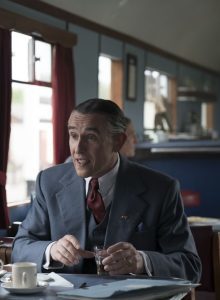
Comedian Stan Laurel (Steve Coogan) does his best to hold his comedy duo together in the face of difficult odds in “Stan & Ollie.” Photo by Aimee Spinks, courtesy of Sony Pictures Classics.
The film has fared well in awards competitions, earning three BAFTA nominations as Outstanding British Film, for Coogan’s lead performance, and for achievements in hair and makeup. The film also earned a Golden Globe nod for Reilly as best actor in a comedy.
Decades after their deaths, Laurel and Hardy still know how to make us laugh, as the re-creations of their routines show in this film. That illustrates the timelessness of their work, as well as the brilliance of those who created it. They truly loved their craft and the spirit of collaboration that they brought to it, an indomitable force that couldn’t be denied, even in the face of growing difficulties. Thank goodness they persevered so that their gift to the world can still be enjoyed to this day.
Copyright © 2019, by Brent Marchant. All rights reserved.
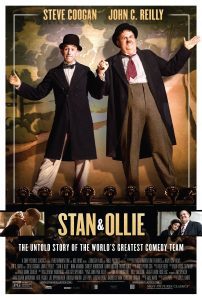
The post ‘Stan & Ollie’ celebrates persistence, reinvention appeared first on Brent Marchant.
February 1, 2019
‘Cold War’ charts the rocky road to peace of mind
‟Cold War” (“Zimna wojna”) (2018). Cast: Joanna Kulig, Tomasz Kot, Borys Szyc, Agata Kulesza, Cédric Kahn, Jeanne Balibar, Adam Woronowicz. Director: Pawel Pawlikowski. Screenplay: Pawel Pawlikowski, Janusz Glowacki and Piotr Barkowski. Story: Pawel Pawlikowski. Web site. Trailer.
Even when we get all the breaks, sometimes life just doesn’t satisfy us. We pursue the opportunities that present themselves, but somehow they inevitably fail to live up to their billing (and our expectations), leaving us feeling unfulfilled. And, if this pattern continues unabated, at some point, we may grow despondent, perhaps engaging in various forms of unproductive or even self-destructive behavior. So it is for an entertainer who has a chance to have it made and ends up sabotaging herself at every turn, a saga chronicled in the melancholic new Polish drama, “Cold War” (“Zimna wojna”).
In 1949 Poland, not long after the fall of the Iron Curtain over the Soviet satellite states of Eastern Europe, the government commissions a pair of professional entertainers, musician Wiktor Warski (Tomasz Kot) and choreographer Irena Bielecka (Agata Kulesza), to scour the country in search of candidates for a troupe of singers, dancers and musicians to give high-profile public performances at home and in foreign lands celebrating traditional Polish folk art. While Wiktor and Irena have some freedom to choose who they want, their work is closely scrutinized by their government sponsor, Lech Kaczmarek (Borys Szyc), who’s concerned that the candidates selected are suitable artistically, politically and ethically, upstanding model citizens of contemporary Communist Polish society.
One aspiring singer, Zula Lichon (Joanna Kulig), captures everyone’s attention. During her audition, the beautiful young vocalist reveals her angelic singing voice. But she also appears to possess a wealth of other qualities that intrigue Wiktor, both personally and professionally. As musical director of the troupe, he takes a special interest in her, seeking to mold her into a featured performer. There’s just one problem: She carries some heavy baggage, having been charged with stabbing her father and being placed on probation. It’s not the kind of reputation that sets well with Kaczmarek, who fears that, if her secret were revealed, it might disgrace the troupe and its prospects for the future.

Polish émigré Zula Lichon (Joanna Kulig) delivers cool but steamy renditions of numbers from her homeland in Parisian nightclubs in director Pawel Pawlikowski’s award-winning new offering, “Cold War.” Photo by Lukasz Bak, courtesy of Amazon Studios.
Wiktor, however, believes that he can manage Zula and keep her skeletons barricaded in the closet. He convinces Kaczmarek to let her become a member of the troupe, and, as the troupe begins touring, Zula is a stand-out sensation, contributing significantly to its popularity and artistic accomplishments. What’s more, the more Wiktor works with Zula over time, the closer they become personally, eventually striking up a torrid but somewhat clandestine romance.
At the same time, Kaczmarek, who also quietly longs for Zula, secretly strikes a deal with her to spy on Wiktor, a condition of her probation aimed at ensuring her loyalty (and, hence, her continued participation in the troupe). Kaczmarek’s interest in keeping tabs on Wiktor stem from suspicions about the director’s commitment to the government’s objectives for the troupe. For instance, Kaczmarek takes note of Wiktor’s less-than-enthusiastic response to a government “suggestion” that the troupe begin performing pieces other than just traditional Polish folk songs, namely, propaganda-based compositions dealing with subjects like land reform and wealth redistribution. Also, given that Wiktor is assumed to be somewhat more free-thinking because of his artistic sensibilities, Kaczmarek can’t help but wonder whether the musical director can truly be trusted.
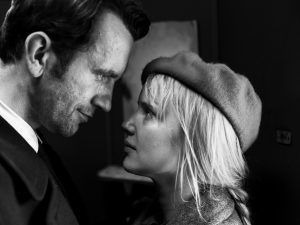
Singer Zula Lichon (Joanna Kulig, right) and musical director Wiktor Warski (Tomasz Kot, left) engage in a torrid romance across Europe in the Oscar-nominated feature from Poland, “Cold War.” Photo by Lukasz Bak, courtesy of Amazon Studios.
As it turns out, Kaczmarek has good reason to have his doubts. During a concert date in East Berlin in the days before the Wall was built, Wiktor hashes out a plan to defect to the West, and he asks Zula to join him. Because of her renegade ways and the feelings he believes she holds for him, Wiktor assumes she’ll join him without question. And, when the time comes to carry out his plan, he successfully makes his move, eventually finding his way to Paris. But Zula surprisingly stays behind, continuing her performances with the troupe. It’s a decision she later regrets, prompting her to find a way to emigrate to Paris, a goal she eventually fulfills.
Thus begins an on-again/off-again romance across a divided continent in which Zula and Wiktor each spends some time in the West and some time in the East, ever searching for the elusive happiness they seem to crave but are never able to find, both personally and professionally, not to mention romantically. Along the way, they have involvements with other partners – Wiktor with a French poet (Jeanne Balibar), Zula with a French filmmaker (Cédric Kahn) and even with Kaczmarek – but they always seem to come back to one another, only to part ways again, that is, until they come up with a unique solution to their unhappiness.

Aspiring performer Zula Lichon (Joanna Kulig, second from left) takes director for choreography instructor Irena Bielecka (Agata Kulesza, second from right) in “Cold War.” Photo by Lukasz Bak, courtesy of Amazon Studios.
“Cold War” is, at times, a frustrating film to watch. One can’t help but hope that Wiktor and Zula will find what they’re looking for, but the picture shows what it means to search for what one wants and never finding it. The protagonists try to claw their way through a maze of self-destructive behavior, some of it understandable, some of it completely inexplicable. It might be tempting to chalk things up to the oppressive conditions under which they live in Communist Era Poland, but, when they’re in the freedom that Paris affords, they seem just as unsatisfied as they were in Warsaw. In many ways, this is a sort of personal hell from which escape seems impossible. There must be a way out, though finding it may be more of a challenge than either of them realizes.
How do such circumstances arise? As in any scenario, they come from our thoughts, beliefs and intents, the building blocks of the conscious creation process, the philosophy that maintains we use these tools to manifest the reality we experience. And, based on what Zula and Wiktor create, they obviously don’t have a handle on what they want for themselves. The conflicted nature of their beliefs becomes apparent in the conflicted nature of their existence.
Clearly, Zula and Wiktor are unable to define what makes them happy, a deficiency reflected in their beliefs and resulting life experiences. One would think that the freedom of the West would be ideal to individuals living under the restricted conditions of the East. However, when someone who is accustomed to rigidly controlled certainty is suddenly presented with unlimited choices, the range of available opportunities can be overwhelming, making it virtually impossible to decide what to select. For Zula, these types of circumstances even predate those that came into effect with the Communist takeover of her homeland; given the household in which she grew up, she obviously suffered the controlling influence of a domineering father, one whose ways eventually led her to lash out at him, as evidenced by the stabbing incident.

The efforts of Wiktor Warski (Tomasz Kot, left), musical director of a Polish performing troupe, are scrutinized by government official Lech Kaczmarek (Borys Szyc, right) to ensure that he adheres to expected official dictates in the new award-winning drama, “Cold War.” Photo by Lukasz Bak, courtesy of Amazon Studios.
When such a fractured outlook becomes ingrained, sooner or later it’s not out of the question for it to lead to questionable behavior, such as the inexplicable acts in which Zula and Wiktor each engage. It’s sad that they’re unable to find a solid footing for their beliefs, because, as conscious creators well know, the process can indeed make any outcome possible as long as we’re focused on what we hope to achieve. But, when one is unable to grasp that fundamental understanding, the result can be chaotic and disappointing, conditions that may lead to desperate measures to find happiness and peace of mind.
Interestingly, the relationship between Zula and Wiktor in many ways parallels the rocky relationship between the West and the East that was going on around them, that they, too, were experiencing a “cold war” of their own on a much smaller but equally turbulent level. Wiktor, who’s all too ready to defect to the West and the possibilities it presents, symbolizes the realm to which he wishes to escape. Zula, on the other hand, who seems more comfortable with controlling influences governing her, represents the authoritarian regime of the East, one that seeks compliance from its constituents regardless of what they may want personally (even if they can figure that out). When you take two individuals with such polarized sensibilities and put them together, is it any wonder that they would have difficulty forging a successful relationship? And, when you combine with that an ability to choose what would make them happy, it’s easy to see why Zula and Wiktor had such an on-again/off-again romance.

Seeking artistic freedom during the early 1950s, Wiktor Warski (Tomasz Kot), musical director of a Polish performing troupe, seeks to make his escape to the West while on a concert date in East Berlin in “Cold War.” Photo by Lukasz Bak, courtesy of Amazon Studios.
For better or worse, such a result is also a product of conscious creation, even if the characters themselves are unaware of it. The beliefs they hold about themselves and the society of which they’re a part permeates their being and every aspect of their daily lives. It’s tragic, though, that they never seem to be able to get it together. Let’s hope we can learn from this cautionary tale and find for ourselves the fulfillment that seems to ever elude them.
This gorgeously filmed, sublimely cool story of troubled romance pays fitting homage to European art films of the 1950s and ʼ60s with a narrative somewhat reminiscent of the French drama “Betty Blue” (1986). Beautifully shot in black and white, director Pawel Pawlikowski’s bittersweet tale features an outstanding performance by Kulig, both in her musical numbers and her diverse dramatic scenes. However, after a strong beginning, the picture begins to meander somewhat toward the middle, as if the director didn’t quite know how to bridge the opening to a conclusion that he already had in mind. It feels like all the makings of a great film are here but that they don’t quite gel as well as they might have in the finished product. See it for the gorgeous cinematography and Kulig’s outstanding performance, but don’t be surprised if you come away from it feeling somewhat like the unsatisfied protagonist.
Despite these shortcomings, the film has been lavished with praise in recent award competitions. At the 2018 Cannes Film Festival, “Cold War” won the award for best director and earned a Palme d’Or nomination, the event’s highest honor. Subsequent to that, the picture was named best foreign language film by the National Board of Review. And, in upcoming contests, this offering has captured three Oscar nominations (best foreign film, director and cinematography) and four BAFTA Award nods (best foreign film, director, original screenplay and cinematography). Previously the picture also received a Critics Choice Award nomination for best foreign language film.

It’s regrettable, perhaps even tragic, when we’re unable to see the good fortune that blesses us. But, for what it’s worth, sometimes that’s not enough to give us what we believe we need to make us feel happy and fulfilled, be it in our love lives, our vocational callings and our very appreciation of life. Stories like those depicted in “Cold War” may sadden us, but one would hope that they leave us grateful for what we have – and make it possible to wish the same to others.
Copyright © 2019, by Brent Marchant. All rights reserved.
The post ‘Cold War’ charts the rocky road to peace of mind appeared first on Brent Marchant.
January 30, 2019
Counting Down the Top 10
Join host Frankie Picasso and me for the next edition of Movies with Meaning on The Good Media Network’s Frankiesense & More broadcast on Thursday, January 31, at 1 pm ET. In this special edition, we’ll talk about the Top 10 Movies of 2018. For the video version, tune in on Facebook Live by clicking here. And, for the audio only podcast edition, check out The Good Media Network’s home page by clicking here. Join us for a fun look back at the year’s best!

The post Counting Down the Top 10 appeared first on Brent Marchant.
This Week in Movies with Meaning
Reviews of “Destroyer” and “Cold War,” as well as a radio show preview, are all in the latest Movies with Meaning post on the web site of The Good Media Network, available by clicking here.



.
The post This Week in Movies with Meaning appeared first on Brent Marchant.
January 25, 2019
This Week in Movies with Meaning
Reviews of “Capernaum,” “An Acceptable Loss” and “Stan & Ollie” are all in the latest Movies with Meaning post on the web site of The Good Media Network, available by clicking here.
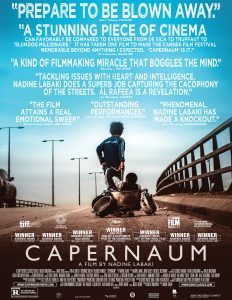



The post This Week in Movies with Meaning appeared first on Brent Marchant.
January 22, 2019
‘Capernaum’ chronicles the creative struggle to survive
‟Capernaumˮ (“Chaosˮ) (2018). Cast: Zain Al Rafeea, Yordanos Shiferaw, Boluwatife Treasure Bankole, Kawsar Al Haddad, Fadi Kamel Yousef, Haita ‟Cedra“ Izzam, Alaa Chouchnieh, Nadine Labaki, Elias Khoury, Nour El Hosseini, Joseph Jombazian, Farah Hasno, Joe Maalouf, Tamer Ibrahim. Director: Nadine Labaki. Screenplay: Nadine Labaki, Jihad Hojelly, Michelle Keserwany, Georges Khabbaz and Khalid Mouzana. Web site. Trailer.
Survival can be a challenging proposition. The more difficult the circumstances, the harder it can be to get out from under. However, the more we can call upon our powers of creativity to come up with innovative solutions, the better our chances of succeeding – which can be critical when we have our very existence on the line. So it is for a young man up against trying conditions in the new, award-winning Lebanese drama, ‟Capernaumˮ (“Chaosˮ).
Growing up as a poor child in Beirut is tough enough. But growing up as a poor child in Beirut to parents who are pathologically neglectful and have had more kids than they can possibly afford is a challenge just to stay alive, let alone to hold on to even the slightest shred of personal dignity. Such is the life that Zain (Zain Al Rafeea) faces every day. His parents, Souad (Kawsar Al Haddad) and Selim (Fadi Kamel Yousef), have birthed so many children that they don’t even know how old their son is (estimates are that he’s 12 to 13). In fact, there are times when it seems like they don’t even know how many kids they have.

Lebanese street kid Zain (Zain Al Rafeea) struggles to survive against incredible odds in the heart-tugging new drama, ‟Capernaumˮ (“Chaosˮ). Photo by Christopher Aoun, courtesy of Sony Pictures Classics.
Conditions like these force young ones to grow up fast. Zain, for instance, has developed a sharp streetwise sensibility at a tender age, much sooner than most other youngsters usually do. He’s learned how to protect himself, how to call things as he sees them, how to swear like a sailor and how not to take any guff from anyone. But, while it’s fortunate that he’s become savvy enough to deal with these circumstances, it’s a shame that he’s being left out of many of childhood’s joys.
To make matters worse, when Beirut’s street kids are deemed old enough, they’re expected to go to work to help support the household, even if they have to forgo school. For Zain and his 11-year-old sister, Sahar (Haita “Cedra” Izzam), this means helping out a local store owner, Assaad (Nour El Hosseini), son of the family’s landlord (Tamer Ibrahim). Zain does odd jobs around the shop and delivers groceries to neighborhood residents. But, as for Sahar, Assaad has other plans in mind. He’s lecherously smitten with her, routinely plying her with little indulgences like ramen and licorice.
Zain is incensed with Assaad’s leering ways. So it comes as no surprise that he loses it when he learns that his parents are looking to trade Sahar’s hand in marriage to Assaad in exchange for rent concessions from his landlord father, a questionable practice but one that’s not unknown in the community. In a fit of anger, Zain lashes out, incurring the ire of his parents in return. He now knows these circumstances are intolerable, so he leaves home without notice to chart a new path for himself.

Beirut street kid Zain (Zain Al Rafeea, left) does his best to protect his younger sister, Sahar (Haita ‟Cedra“ Izzam, right), against their unscrupulous parents and a lecherous store owner in the award-winning new Lebanese drama, ‟Capernaumˮ (“Chaosˮ). Photo by Christopher Aoun, courtesy of Sony Pictures Classics.
Zain initially plans to relocate to his grandmother’s home. But, while traveling there, he changes his mind when he comes upon an amusement park. The colorful, lively attractions captivate him, given that they’re so different from what’s he accustomed to. He decides to explore what it has to offer, abandoning his original plan. He lives by his wits and begins looking for work from the local vendors, but no one is willing to hire him.
But all is not lost: Zain captures the attention of Rahil (Yordanos Shiferaw), an illegal alien from Ethiopia who works at the park under an alias using falsified immigration papers that are about to expire. Rahil has her hands full as the single mother of a toddler, Yonas (Boluwatife Treasure Bankole), so she’s limited in terms of how much help she can provide to Zain. However, given that she now has access to a potential babysitter, she can leave Yonas at home while she works, an option preferable to dragging him to her job and hiding him in a bathroom stall during her shift. And, in exchange for Zain’s services, Rahil provides him with food and a place to stay. It’s an arrangement that works relatively well, too – that is, until Rahil is picked up and incarcerated by authorities for immigration violations. To make matters worse, her arrest takes place without Zain’s knowledge. Suddenly the adolescent youngster is left to care for himself and a toddler all on his own.

Rahil (Yordanos Shiferaw), a single mother and illegal alien from Ethiopia working in Lebanon, does what she can to make ends meet for a growing toddler in director Nadine Labaki’s ‟Capernaumˮ (“Chaosˮ). Photo by Fares Sokhon, courtesy of Sony Pictures Classics.
To say more would reveal too much, but suffice it to say that Zain’s circumstances grow progressively more challenging, particularly when he’s forced into dealing with assorted shady characters, such as a crooked flea market vendor (Alaa Chouchnieh), to get by. His survival skills serve him well under these conditions, but eventually even they get pushed to the limit. A course of events is set in motion that require him to make hard choices and take drastic measures that have the potential to land him in trouble. But, with courage and some inventive thinking, he’s determined to have his say – even if it means doing so in court against unlikely opponents.
“Capernaum,ˮ which translates as “Chaos,ˮ couldn’t be a more fitting title for this film. The deplorable conditions depicted here are something no one should have to endure, especially someone as young as Zain. Between the irresponsibility of his parents, the street life of Beirut and the circumstances of being thrust into becoming a caretaker for a young child who isn’t even his own, Zain has his hands full coping with the chaos around him. Yet somehow he manages to survive, because he believes he can. This is an outcome made possible by the conscious creation process, the philosophy that maintains we manifest the reality we experience through the power of our thoughts, beliefs and intents. And the beliefs that Zain staunchly holds onto are precisely what he needs to stay afloat.
As becomes apparent from the film’s outset, Zain is a survivor because he needs to believe that he is one in order to get by. He has an unshakable faith in his abilities to somehow find a way to contend with the challenges facing him. And, with each new obstacle, he must continually steel his resolve in those beliefs and that faith, especially since the stakes get upped every time.

Runaway street kid Zain (Zain Al Rafeea, background) becomes an impromptu babysitter for Yonas (Boluwatife Treasure Bankole, foreground) when the toddler’s mother goes to work in ‟Capernaumˮ (“Chaosˮ). Photo by Christopher Aoun, courtesy of Sony Pictures Classics.
Some might see the creation of such conditions as intolerable. However, as difficult and insufferable as they may seem to many of us, what better way is there to build up one’s fortitude, a crucial life lesson that we must all face at some point in our personal growth and development? It forces us to toughen our shells, as well as to think more creatively, outside the box and beyond conventional limitations. It requires us to build up our reserves of courage, to cast aside fears that might otherwise hold us back. And it’s essential considering the alternative.
Zain does all of this during his remarkable journey, and he does so on multiple fronts. That routinely calls for him to gather his wits and summon up whatever wherewithal he can muster to address the many issues he encounters. We can all learn a lot from his example, both in terms of our coping skills and our inventiveness. He simply doesn’t have the luxury of throwing up his hands and quitting. We should follow his lead when we face crises of our own.
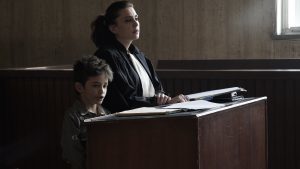
To address past transgressions, runaway street kid Zain (Zain Al Rafeea, left), represented by his attorney (Nadine Labaki, right), takes on unlikely opponents in court in the award-winning new release, ‟Capernaumˮ (“Chaosˮ). Photo by Fares Sokhon, courtesy of Sony Pictures Classics.
It’s a rare feat that a film is able to simultaneously warm and break your heart at the same time, but this intense, involving offering does just that. Director Nadine Labaki’s heart-tugging saga of children being left to fend for themselves by unfeeling parents and an unfeeling bureaucracy evokes genuine emotion through a story that’s presented with stark realism and not narrative manipulation. The performances of the two children are indeed impressive, making you feel as though you’re right alongside them in their harrowing odysseys. Because of that, you’ll want to keep the hankie handy for this one; you’ll need it for when the film touches your heart and for when it nearly rips it out of your chest.
“Capernaum” has been widely recognized in awards competitions – and deservedly so. The film captured three honors at the 2018 Cannes Film Festival, including the Jury Prize, the Ecumenical Jury Prize and the Prix de la citoyenneté (Social Responsibility Award), along with a Palme d’Or nomination, the event’s highest award. More recently, the picture was named a nominee in the foreign language film category in the upcoming Academy Award and BAFTA Award contests. Comparable nods were also bestowed on the film in the Golden Globe and Critics Choice Award competitions, though it took home no statues in either contest.
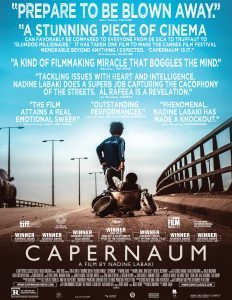
It’s tragic that anyone should have to experience the kinds of circumstances that kids like Zain endure. Thankfully, though, we should be grateful for the creative resources that are available to us all to overcome such situations. They’re there when we need them, and all we need do is avail ourselves of them. The outcomes that result from doing so may truly surprise us, enabling us to ultimately turn things around in the end.
Copyright © 2019, by Brent Marchant. All rights reserved.
The post ‘Capernaum’ chronicles the creative struggle to survive appeared first on Brent Marchant.
January 20, 2019
‘An Acceptable Loss’ grapples with responsibility, redemption
“An Acceptable Loss” (2019). Cast: Tika Sumpter, Jamie Lee Curtis, Ben Tavassoli, Jeff Hephner, Deanna Dunagan, Alex Weisman, Ali Burch, Clarke Peters, Rex Linn, David Eigenberg, Carmen Roma, Tim Hopper. Director: Joe Chappelle. Screenplay: Joe Chappelle. Web site. Trailer.
In an age when it’s become all too easy to abandon responsibility, especially among those in positions of authority, it’s refreshing to see those who are willing to own up to their mistakes and even seek to redeem themselves for their oversights and misdeeds. But even those who genuinely attempt to make up for these shortcomings may face a difficult time of it and through no fault of their own. So what is one to do under such circumstances? That’s one of the central questions raised in the intense new political thriller, “An Acceptable Loss.”
Former National Security Advisor Elizabeth “Libby” Lamm (Tika Sumpter), once a powerful and influential counselor to the President, has become something of a reclusive enigma since her resignation four years ago. Even though she had attained an enviable status with the former chief executive (Rex Linn) and the current commander-in-chief, former VP Rachel Burke (Jamie Lee Curtis), Libby has a cloud hanging over her head. She rarely makes public appearances, and, when she does, she’s usually met with derisive looks or outright hostility. Because of that, she tends to keep to herself. She’s even cut herself off from most outside means of contact, having no cell phone, email address or social media connections. Why the secrecy?

Former National Security Advisor Elizabeth “Libby” Lamm (Tika Sumpter, right) confers with her onetime boss, President Rachel Burke (Jamie Lee Curtis, left), regarding matters of global importance in the taut new political thriller, “An Acceptable Loss.” Photo courtesy of IFC Films.
Libby’s efforts at keeping an intentionally low profile become more difficult, however, when she accepts a teaching position at a major university in Chicago. Suddenly she’s in the spotlight again, perhaps not as much as before, but any visibility is more than what she’s experienced for quite some time, and it makes her conspicuously uncomfortable. Libby’s department chairman (Deanna Dunagan) tries to make the new arrival feel as welcome as possible, but the pall hanging over Dr. Lamm always seems to cause embarrassment, difficulty or distress. Libby’s newly assigned personal assistant (Ali Burch) is anything but hospitable, and, at a faculty reception in her honor, Libby encounters loud and spiteful criticism from a fellow professor (David Eigenberg). Life in her new profession isn’t going to be easy.
About the only person in Libby’s corner is her father, Phillip (Clarke Peters), a newspaper publisher. He does his best to offer support, but even his reassurances aren’t enough to silence the whispers and stifle the pointed fingers directed squarely at his daughter. She’s even concerned about how much contact he should have with her for fear that guilt by association may harm his reputation.
So, under these circumstances, Libby quietly goes to her job every day, followed by a neighborhood jog and then a return home to work on a lengthy document that she writes out in long hand on legal pads. She’s exceedingly intent in working on the document, sometimes spending hours on end at it. And, upon finishing her writing each day, she locks up her papers in a sturdy antique safe. Whatever it is she’s writing, it must be pretty important if she’s willing to go to such lengths as composing it without the aid of a computer and then securing it so secretively.
As all of this unfolds, another issue arises. Unbeknownst to Libby, she’s being followed by a mysterious stalker who turns out to be one of her pupils, Martin Salhi (Ben Tavassoli), a foreign exchange grad student. What exactly does he want? Is he a would-be romantic interest? An obsessive fetishist? Or is he something else entirely? His methods and motives are unclear, but, as his actions grow progressively more cryptic and questionable, he begins raising suspicions among others, most notably his roommate, Jordan (Alex Weisman). What’s Martin up to?

President Rachel Burke (Jamie Lee Curtis, left) knows she can count on the loyalty of her fiercely devoted Chief of Staff, Adrian Little (Jeff Hephner, right), in the taut new political thriller, “An Acceptable Loss.” Photo courtesy of IFC Films.
And, if that weren’t enough, Libby starts receiving visits from ghosts of her past, most notably now-President Burke and her fiercely loyal Chief of Staff, Adrian Little (Jeff Hephner), Libby’s onetime romantic partner. The visits are contentious, to be sure. Libby is told that she’d be warmly welcomed back into the fold if she chose to return to the President’s service. But she’s also sternly cautioned that there would be serious consequences if she doesn’t toe the line in her expected conduct now that she’s returned to the public spotlight. She’s obviously carrying potentially explosive secrets around with her, but what could they be? And what consequences would their revelation involve, both for Libby personally and the country (and world) at large? What’s more, what role does the stalker play in all this? Indeed, why is everyone pursuing Libby?
To say more would reveal too much, but suffice it to say that what lies ahead for all concerned – including the nation itself – carries implications of staggering proportions. How everyone fares will depend on how prepared they are to weather the storms coming their way – and whether those preparations are truly adequate.
So the question that naturally gets raised here is, how did Libby and everyone around her end up in these circumstances? The answer rests with the characters themselves and what they brought into being, outcomes driven by their beliefs, the building blocks of the conscious creation process, the philosophy that maintains we manifest the reality we experience through the power of our thoughts, beliefs and intents. And, given what’s at stake, the creators at work here are obviously dealing with some incredibly powerful notions.

Tensions rise between Former National Security Advisor Elizabeth “Libby” Lamm (Tika Sumpter, right) and her onetime boss, President Rachel Burke (Jamie Lee Curtis, left), in director Joe Chappelle’s taut new political thriller, “An Acceptable Loss.” Photo courtesy of IFC Films.
As becomes apparent in the film, both through the main narrative and a series of flashbacks showing how these conditions arose, there are some very driven characters materializing what’s happening around them. They’re quite singularly focused, determined to bring about the results they want at seemingly any cost. Such conviction can be a valuable asset to a conscious creator’s efforts, but it can also be a tremendous liability when it’s let loose without consideration for the ramifications. When we seek to elicit what we want without concern for the fallout that can accompany such outcomes, we engage in un-conscious creation or creation by default, a dangerous practice that can yield far more than we bargain for, including any number of unpleasant side effects.
Such a practice also tends to show a disregard for the responsibility that’s inherent in conscious creation. We can’t legitimately take credit for certain manifestations and claim that others “just happen.” Since we’re the ones who produce what results, what ultimately materializes originates with us, making us the responsible parties for what arises. This is something we can’t abrogate as long as we engage in the process.
When “unintended” or “unwanted” outcomes result from our manifestation efforts, we must own up to them, regardless of their nature. For those who do, there may be feelings of regret or remorse that accompany the acknowledgment of these missteps. Yet, as difficult as accepting such circumstances may be, we can always make amends for the errors of our ways. We’re not perpetually saddled with such a fate; we can redeem ourselves, though we must be clear about our intents in doing so. And, as this story reveals, there’s certainly an effort being made to make that happen.
Of course, for redemption to occur, we must take certain steps first. For starters, we must overcome whatever fears or apprehensions that might hold us back. Then we must formulate beliefs necessary to implement the actions required to make redemption possible. This may call upon us to think creatively in terms of the measures we take, sometimes instituting means that are outside the box. None of this may be easy, but it is always possible, given that conscious creation enables the materialization of anything conceivable. And, considering what’s at stake here, that’s an outcome everyone would like to hope for.
“An Acceptable Loss” positively blew me away. Filmmaker Joe Chappelle knocks this one out of the park, presenting us with a taut political thriller that dispenses its secrets in exactingly measured doses, careful not to expose too much all at once but always maintaining enough viewer interest to stay hooked. This technique, reminiscent of the work of director Roman Polanski, thus makes it possible for the big reveal to have maximum impact when it’s finally exposed, walloping the audience with a revelation that will easily leave one agasp, as is the case here. On top of this, the performances are all solid, though special recognition goes out to Curtis, who turns in what is arguably the best on-screen portrayal of her career, giving us a character who is a cleverly crafted fusion of Hillary Clinton and Dick Cheney. The mileage that Curtis gets out of gestures as simple as her facial expressions is truly impressive.

All of these elements conspire to give us an unforgettable picture. It’s indeed unfortunate, though, that this film has received such unfairly negative reviews, assessments that have been downright criminal in my view. I’m shocked at the petty criticisms that have been leveled against this picture, including some that have come down on it for daring to have a point of view (what movie doesn’t have a point of view?). Pay no attention to the naysayers behind the curtain and see this one, whatever way you can (either in its limited theatrical release or via online streaming). It’s a well-made film, and it imparts an important message that every American should heed.
Given the prevailing social and political climate, finding those who behave honorably has become an increasingly challenging task. So when there are those who willingly step to the fore who exhibit such behavior these days, it’s almost inconceivable that they would do so. Thankfully, the examples set in this film provide us with anticipation that such individuals still exist. Let us hope that we see them on places other than the movie screen.
Copyright © 2018-19, by Brent Marchant. All rights reserved.
The post ‘An Acceptable Loss’ grapples with responsibility, redemption appeared first on Brent Marchant.



